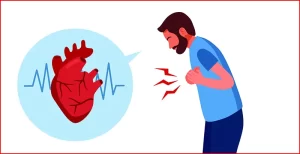

Chest pain manifests as discomfort or pain within the chest region, potentially radiating to other areas of the upper body, such as the arms, neck, or jaw. The sensation may vary, presenting as either a sharp or dull pain, accompanied by feelings of tightness, achiness, or a sense of pressure on the chest.
The duration of chest pain can range from a few minutes to hours, and in certain instances, it may persist for six months or more. Typically, the pain intensifies during physical exertion and subsides during periods of rest, although it can also occur while at rest. The pain may be localized to a specific area or have a more diffuse, general quality. It can occur on the left side, in the middle, or on the right side of the chest.

Chest Pain Treatment in Jaipur
Symptoms of chest pain associated with your heart may manifest as:
Additionally, you may experience:
The most common causes of chest pain include:
Angina: Chest pain or discomfort caused by reduced blood flow to the heart muscle.
Heart Attack: A sudden blockage of blood flow to the heart, leading to damage of the heart muscle.
Gastroesophageal Reflux Disease (GERD): Stomach acid flowing back into the esophagus, causing irritation and chest pain.
Muscle Strain: Overexertion or injury to the chest muscles can result in pain.
Costochondritis: Inflammation of the cartilage where the upper ribs attach to the sternum.
Lung Issues: Conditions like pneumonia or a blood clot in the lungs can cause chest pain.
Panic Attack: Sudden intense anxiety or fear can lead to chest pain.
Peptic Ulcer Disease: Sores in the lining of the stomach or upper intestine can cause abdominal and chest pain.
Pleurisy: Inflammation of the lining around the lungs can cause sharp chest pain, especially during breathing.
Aortic Dissection: A tear in the inner layer of the aorta, the large blood vessel branching off the heart.
If you experience chest pain persisting for more than five minutes that doesn’t subside with rest or medication, seek immediate assistance. Cardiac chest pain poses a potentially life-threatening risk.
Chest pain may indicate a heart attack. Additional signs of a heart attack include:
The treatment for chest pain is contingent upon its underlying cause. In the case of chest pain caused by a heart attack, immediate emergency treatment is administered upon seeking help. This may involve medications and procedures or surgery aimed at reinstating blood flow to the heart.
For chest pain stemming from non-cardiac conditions, your healthcare provider will discuss treatment options with you. Depending on the nature and severity of your illness, they may suggest:
Selecting Dr. Prakash Chandwani (Interventional Cardiologist in Jaipur) for chest pain treatment in Jaipur offers several compelling reasons:
Expertise: Dr. Prakash Chandwani is a highly experienced and skilled healthcare professional with specialized knowledge in the field of chest pain treatment.
Specialization in Cardiology: Dr. Chandwani specializes in cardiology, focusing on heart-related conditions, including chest pain. This specialization ensures a deep understanding of cardiac issues and effective treatment strategies.
Proven Track Record: Dr. Chandwani has a track record of successful outcomes in treating patients with chest pain, providing a level of confidence and assurance to those seeking medical care.
Comprehensive Care: Dr. Prakash Chandwani offers comprehensive care, encompassing diagnosis, treatment, and ongoing management of chest pain. This holistic approach ensures that patients receive thorough and personalized medical attention.
Chest pain can have various causes, including cardiac and non-cardiac issues. If you’re uncertain about the origin of your chest pain or if it’s accompanied by other symptoms such as shortness of breath or nausea, it’s crucial to seek medical attention promptly.
Your healthcare provider may recommend lifestyle modifications such as dietary changes, regular exercise, stress management, and smoking cessation to minimize the risk of chest pain and promote overall heart health.
Yes, signs such as pain radiating to the arms, jaw, or back, along with sweating, nausea, or shortness of breath, may suggest a cardiac origin. If you experience these symptoms, seek emergency medical attention.
Depending on your symptoms and medical history, your healthcare provider may recommend tests such as an electrocardiogram (ECG), stress test, chest X-ray, or blood tests to help diagnose the underlying cause of your chest pain.
Heartburn typically presents as a burning sensation in the chest and may be relieved with antacids. Cardiac chest pain, on the other hand, may involve feelings of pressure, squeezing, or tightness. If in doubt, seek medical advice to rule out any serious cardiac issues.
for book your instant appointment fill below form and get your slot for appointment.